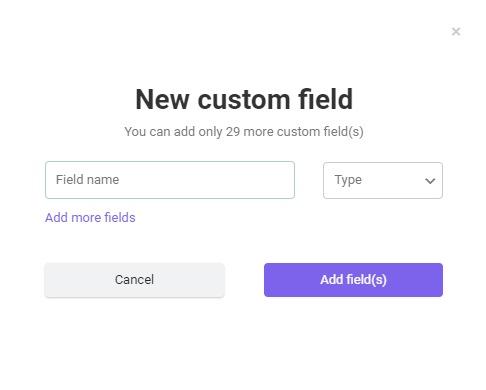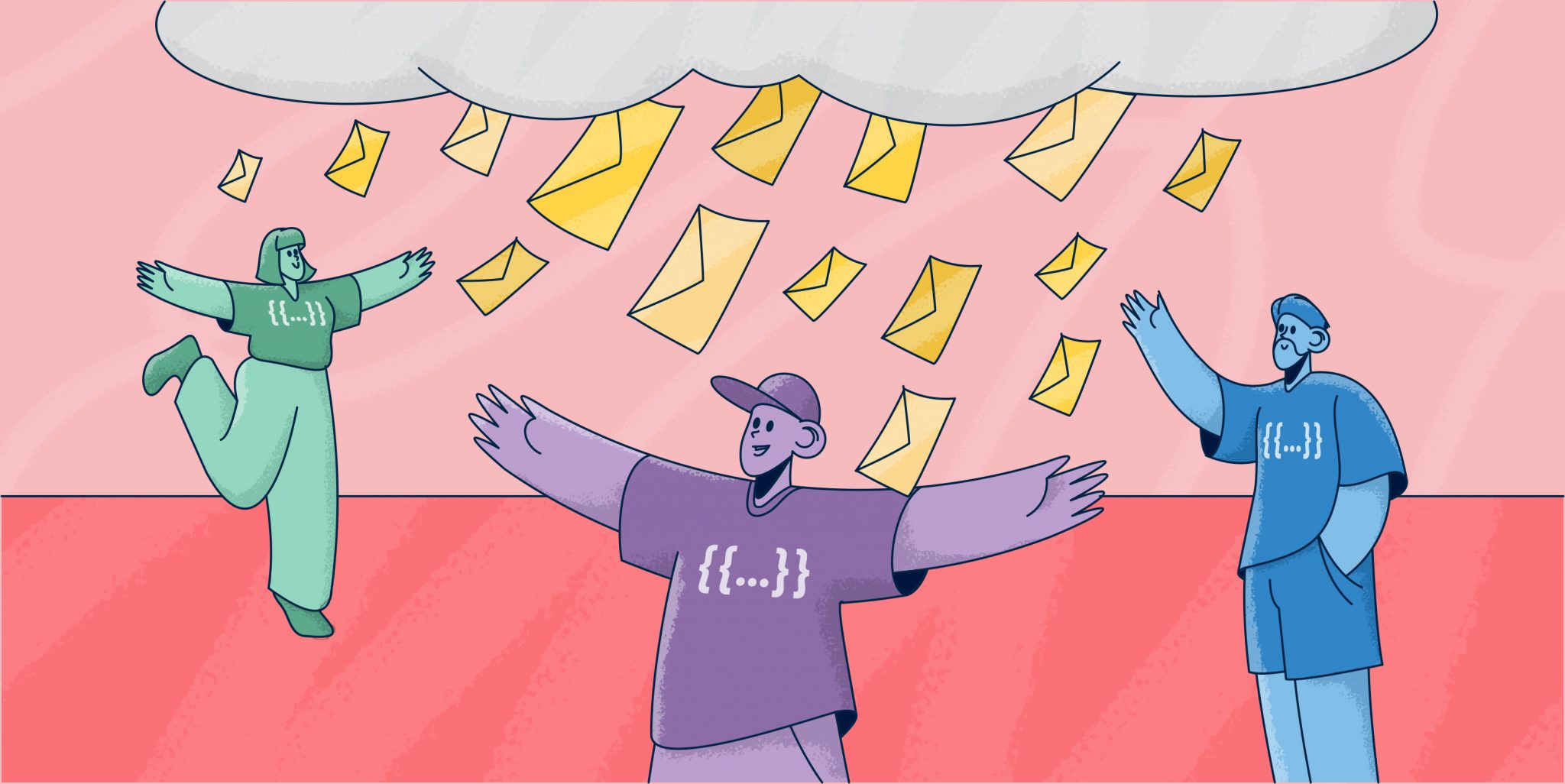While personalization is an absolute must for email marketing, it’s a big challenge for cold email automation when you need to send your messages to prospects in bulk.
Luckily, email marketing services such as Snov.io have elaborated on ways to help you personalize your emails at scale. In one of our previous posts, we’ve already discussed how you can personalize your emails using Snov.io + Hyperise combo. In this article, we’ll tell you about Snov.io email variables and share some examples of their practical application.
What is the essence of email variables?
Email variables, also called ‘merged fields,’ are pieces of text in email templates that are automatically filled with the corresponding data about email recipients when they receive your message.
For example, if you are going to send your email to about 500 prospects, you don’t need to do a crazy job inserting the name of each of them individually and sending emails one by one. You can automate your efforts using a {{First Name}} variable in your template, so each recipient gets an email with their name.
Each email automation service offers its own variables, but the basic variables such as {{First Name}}, {{Last Name}}, or {{Company Name}} are usually present in all email marketing tools.
In this guide, we’ll discover what variables you can use with Snov.io to personalize your email outreach, along with examples.
Types of email variables with examples
In Snov.io, email variables are divided into two types: system variables and custom variables. Let’s consider both types in detail.
1. System variables
System variables are embedded into the service by default, such as name, link, location, industry, and company variables.
Name variables
Name variables are one of the most widespread email variables, allowing you to address each of your prospects by name. Here you can choose among three options, addressing a person:
- By the first name (in case you know your prospects prefer an informal style of communication),
- By the last name (say, if you choose a formal way of addressing recipients like Mr/Mrs),
- By the full name (for cases when you are not quite sure which name is a person’s first and last – this is especially important if you deal with prospects from specific cultural backgrounds you are unfamiliar with).
Here’s an example of how you can use a name variable in your email:

As you see, you can add a name variable not only to the email body but also to the subject line, which, by the way, can increase your email open rates by 50%.
Location variables
Knowing your prospect’s location, you can segment the email list more thoroughly and use this information to connect with prospects through your cold email campaigns. In Snov.io, for instance, you can add a location or, more specifically, country variable to the email, so every prospect from your list will automatically receive a relevant message.
Let’s consider an example:

Industry variables
If you work with customers that represent various industries, it’s a good idea to add this information to their profiles and use it in cold emails for building connections. An industry variable is what will come in handy in this case.
Let’s consider how you can modify the previous email template provided you’ve gathered information about a prospect’s industry but didn’t know enough facts about their location:

Link variables
To build rapport with your prospects, you should demonstrate that you’ve done some research before contacting them. Today, nothing will tell you more about potential customers than their social networks.
Spending time on your prospects’ LinkedIn or Twitter page, you’ll learn a lot about their business goals, achievements, hobbies, and interests. Using this information later in your cold emails will be an effective way to hook their attention and come off as a serious persona to continue communication with.
In Snov.io, you can use link variables that transform into corresponding links to a prospect’s LinkedIn, Facebook, or Twitter pages.
For example:

Company variables
If you work in B2B, you’ll inevitably have to mention a prospect’s business or product in your email campaigns. That’s why company variables for your email templates are a wonderful opportunity to automate the process and yet make emails personalized.
In Snov.io, you can use such variables as Company name, Company website, and prospect’s Position.
Let’s consider an example of a template with a Company name variable:

If your product covers the needs of a variety of specialists, I recommend that you include a Position variable in your email template, for instance:

2. Custom variables
You can enrich the personalization of emails using custom variables. In your Snov.io account, you can create up to 30 custom fields with the prospect information and use it as variables in your bulk email campaigns.


I’ll show you several examples of custom variables I would make and use as a sales specialist for my cold outreach.
Remember: you can create your own custom variables relevant to your industry, product, and prospects.
Company type variables
Apart from getting information about your prospect’s company name, you can gather data about its size and type, e.g., startups, bigger companies, or enterprises. Once creating the company-type custom field and adding this information there, you’ll be able to use the corresponding variable in your bulk email campaigns.
Here’s an example of a message with a company-type variable I’ve created myself:

Your startup prospects will receive a message “Since Snov.io has already helped other startups…,” while big enterprises within your list will get a corresponding “Since Snov.io has already helped other enterprises…” Why not kill two as-many-as-you-wish birds with one stone?
Technology variables
For SaaS companies, the technology they operate on plays an important role. But what if you can use this information to personalize your bulk email outreach? You just need to create a Technology custom field to enrich prospect profiles with the technology data and use a technology variable in your email template.
Take a look at the following example:

Competitor variables
It’s no surprise that in sales psychology, ‘FOMO,’ or fear of missing out, is one of the basic customer feelings. Nothing motivates a prospect to consider your offering better than information that their competitors are already successfully using your product or service and enjoying its benefits.
Gather information about your prospects’ main competitors, create a corresponding custom field, and add a competitor variable to your email message to emphasize the value of your solution and stimulate prospects to react to your cold email without delay.
Here’s a template example with the inserted competitor variable:

Interest variables
Remember, I mentioned the importance of researching social networks for building rapport with prospects? I won’t exaggerate if I tell you that a sentence about their hobbies and interests at the beginning of your cold email can serve as a very effective icebreaker.
So, whenever you see something personal in a LinkedIn bio, something a prospect is keen on in life, add it to the interest custom field, and the corresponding variable will help you make a highly-personalized lead-in to your cold email.
Just like in this example:

Combination of variables
In practice, your message will likely consist of several variables, not just one. You will wish to address a prospect by name, mention their company name, state the reason for connection by referring to their social network profiles or speaking about mutual interests, say something about their competitors, etc.
Let’s look at the example of a cold email template with a combination of variables:

You can combine as many variables as you wish and be sure each prospect will get a relevant message.
Variables with missing information
But what if, in some cases, the prospect information needed for a variable is unavailable?
In Snov.io, each time you’ll insert a variable, a FALLBACK word will follow it:

Instead of this word, add a word or phrase that will appear in your email if your prospect lacks the data necessary to fill the variable. For example, for name variables, you can add the word “there,” so if any of your prospects from your long list are missing this information, they’ll get a message with a “Hi there” greeting.
Wrapping up
Email variables you’ll find in email automation services are good proof that bulk email personalization is possible.
Snov.io offers system and custom variables, which will help you send cold emails to a long list of contacts without fear any of them will get an irrelevant message. All you need is to enrich your prospect profiles with the information that will then appear instead of variables.
With Snov.io, cold outreach has never been so easy. Ready to explore its other tools? Welcome onboard!





